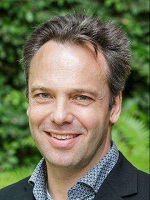June 2018 - Gene-by-SES interplay in health behavior
On Wednesday, June 6, dr. Titus Galama (University of Southern California, USC) visited us at the Faculty of Economics and Business to talk about his latest research on gene-by-SES interplay in health behavior. This seminar was organised by Centre of Expertise Healthwise, the signature area Public Health and the Aletta Jacobs School of Public Health.

About dr. Titus Galama
Titus Galama, Ph.D., MBA, is a Senior Economist at the University of Southern California (USC) Dornsife Center for Economic and Social Research (CESR), and Director of the CESR Center for the Study of Health Inequality (CSHI), Los Angeles, California, U.S.A. Titus is an award-winning astrophysicist who turned to business/management then policy analysis and economics. Titus Galama was awarded a M.Sc. in Physics in 1995 (cum laude) and a Ph.D. in Astrophysics in 1999 (cum laude) from the University of Amsterdam, the Netherlands, an MBA in 2003 from INSEAD, France/Singapore and a Ph.D. in Economics in 2011 from the University of Tilburg, The Netherlands. He has been at the forefront of several breakthrough discoveries in astrophysics, two of which were considered the 5th and 10th most significant scientific discoveries (in all science fields) of 1997 and 1999, respectively, by Science magazine.
After completion of his thesis in astrophysics he worked as a Fairchild Postdoctoral Prize Fellow at the California Institute of Technology (Caltech), Pasadena, U.S.A. He has authored over 70 scientific publications in top scientific journals (e.g., six papers in Nature). Following his career in astrophysics, he obtained an MBA from INSEAD at the Singapore and French campuses, and subsequently joined L.E.K Consulting, a global strategy-consulting firm, as a Senior Consultant in the Los Angeles office. Titus joined the RAND Corporation in 2006 and USC’s CESR in 2013. In these positions his focus has been on understanding the substantial disparities in health by socioeconomic status, utilizing economic principles. To this end he has developed structural theoretical models of health and retirement and of the formation of disparities in health between socioeconomic status groups.
Read more:
> Go to Galama's website
Abstract
Gene-by-SES interplay in health behavior: theory and empirics
Smoking and obesity are the top-two leading causes of preventable disease and death in the U.S. and significant sources of the substantial disparities in health between socioeconomic status (SES) groups. We utilize recent discoveries of genetic variants exhibiting credible and robust associations with smoking and obesity to study the effects of genetic predispositions, in interaction with the socioeconomic environment of the family during childhood, on risky health behavior and on health disparities. To interpret the analyses we develop a lifecycle theory of gene-by-SES interplay in unhealthy behavior. The theory provides a conceptual framework for analyzing the role of genetics in explaining health behaviors, such as smoking and overeating, and how SES moderates this process. The theory predicts rich interactions between genes, SES, health behavior, health and longevity. For example, SES increases the marginal value of health, thereby increasing the demand for health investment and reducing the demand for unhealthy consumption. Withdrawal, tolerance, and reinforcement, however drive unhealthy behaviors forward. These competing effects suggest SES protects individuals from detrimental genetic endowments by raising the value of health, reducing consumption and addiction.

